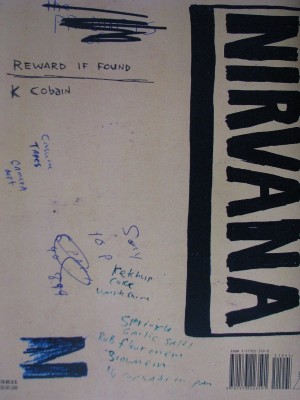A Look Inside Kurt Cobain
Editorial note: With the 20th anniversary of Nirvana’s most acclaimed album, Nevermind, coming up in September, here is a revisit of Kurt Cobain’s personal writings.
Imagine a rabid Wall Street stockbroker running around on 13 cups of coffee, no sleep, and a hint of cocaine, muttering incoherent sentences to the amusement of his colleagues as the rat race known as life continues in fast forward. Got the image in your head? Congratulations, you have just won yourself a taste of Kurt Cobain’s Journals.
This is no Anne Frank’s diary. Nor is it your friend’s high school marble notebook, full of teenage drama confessions of her ex-boyfriend, Tommy, kissing a girl with side bangs, who in fact turned out to be a boy. Rather, it’s a completely dysfunctional look into the frenzied mind of a talented grunge rock musician, who changed the meaning of music for generations to come.
Like Nirvana’s music, Cobain’s journals are raw and authentic. They speak to the masses through their direct, contemplative language and entries. Hand-written and preserved, these 304 torn out pages, which were originally from 20 different notebooks, are a reminder of his struggles and annoyances within his personal community, and the music industry. The entries found in this collection of Cobain’s writing date back to the early 80s and end with his suicide in ’94. Yet, in this cozy seat of Cobain’s personal confessional booth, you won’t find any clues or lead-ups to that fateful and rather unfortunate event.
In its place, the pages overflow with old letters addressed to fellow grunge musicians, detailed shopping lists, violent cartoon drawings, overly scratched out lyrics, newspaper clippings, and personal thoughts. Ostensibly, these all may appear disjointed to even the most avid of readers as Cobain flips from one idea to the next in a matter of seconds. However, given a closer look, behind the drug influenced incoherencies and word scratch-outs lay creatively hidden messages of life’s unpredictability and injustices. Pictures of the Ku Klux Klan, misplaced exaggerated cusses, and first attempts at lyrics of “Smells Like Teen Spirit,” which are nothing like the end result, span the first few pages, giving a good impression of the rest of the book.
Still, despite its morose tone and unsympathetic approach through monologue based rants, Cobain’s journals provide a bit of humor, as well as sincere affection for his wife Courtney Love, and daughter Frances Bean. But don’t expect heart outpouring love letters to both. All Cobain has to offer are a few kind words here and there entwined with doubts and anger. “I’ll go out of my way to remind her that I love her more than I love myself,” Cobain says of his daughter toward the end of the collection, as he contemplates the idea that Courtney may try to take away his custody rights of their then unborn child. Never is it implied that she in fact threatened this.
The Journals of Kurt Cobain, even with their eeriness and depressive nature, are a simple truth of the reality of not only Cobain’s own life, but the time period and hierarchy class he lived in. Most importantly, the Journals give an honest look into the music industry, their scams, and indecencies involved through an individual’s eyes that had no regards for it giving it a quintessential perspective. In a humorous nature that rings of spite and judgment, Cobain rips apart Pete Townshend, the lead singer of the WHO, in one of his entries as he pursues down the “diabolical” path of criticizing the rock press establishment and censorship in music. “I hope I die before I become Pete Townshend,” Cobain wrote.
As one reads entry after entry of Cobain’s personal journals, it is hard to imagine the decomposed rocker on being content with this. With an entry line that reads “don’t read my diary when I’m gone,” to further prove the point of the dangerously haunting territory one subjects themselves to by reading Cobain’s words. “If you’ll read, you’ll judge,” Cobain scribbled on the cover page. And judge is what we do despite the good intentions of a psychiatric examination of a human being who just wanted a lifeboat from the loneliness that lurks in America.











